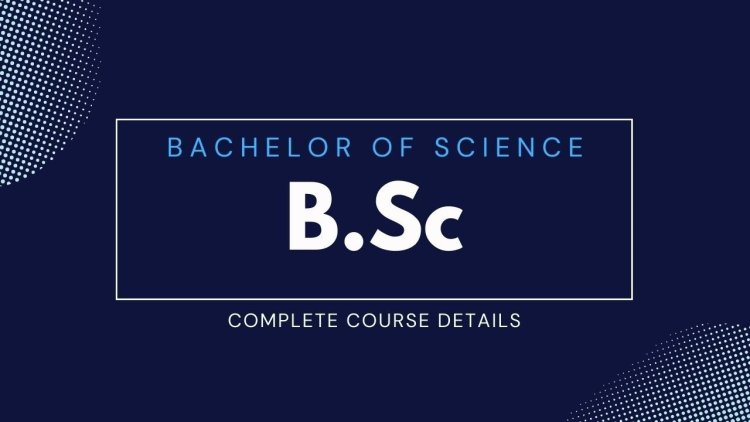The Role of Research in a BSc Program: What Students Need to Know
Explore the role of research in a BSc program and how it enhances learning and career opportunities. Understand the BSc full form, benefits, and key research skills.

Research plays a crucial role in higher education, particularly in Bachelor of Science (BSc) programs. Unlike other undergraduate degrees that might focus primarily on theoretical knowledge, a BSc integrates hands-on research to provide students with practical experience, problem-solving skills, and critical thinking abilities. Understanding how research fits into a BSc program can significantly enhance a student's learning journey and open doors to rewarding career opportunities.
This article explores the role of research in a BSc program, why it is essential, and how students can excel in this aspect of their studies.
What is a BSc?
The BSc full form is Bachelor of Science. It is an undergraduate degree focusing on science, technology, engineering, and mathematics (STEM) fields. Students pursuing a BSc often dive deep into subjects such as biology, chemistry, physics, computer science, and more.
A hallmark of BSc programs is their emphasis on blending theoretical learning with practical applications. Research projects, lab work, and experiments are integral components, helping students understand real-world applications of their studies.
Why is Research Important in a BSc Program?
-
Hands-On Learning
Research helps students apply theoretical knowledge in real-world settings. It enables them to test concepts, validate hypotheses, and understand the practical aspects of their field. -
Skill Development
Research fosters critical thinking, analytical skills, and technical expertise. Students learn to collect data, analyze results, and draw meaningful conclusions. -
Problem-Solving Abilities
Research tasks often involve addressing complex problems, allowing students to develop innovative solutions. -
Career Advancement
Participation in research projects enhances a student's resume. It demonstrates initiative, expertise, and practical knowledge, which are highly valued by employers and graduate schools. -
Networking Opportunities
Research often involves collaboration with professors, industry experts, and peers, offering students valuable networking opportunities.
How Research Enhances a BSc Program
1. Lab Work and Experiments
Laboratories are at the heart of a BSc program. Whether it's testing chemical reactions in a chemistry lab or analyzing data in a computer science lab, students gain practical exposure through hands-on experiments.
2. Independent Projects
Many BSc programs require students to complete an independent research project or thesis. These projects allow students to explore a specific topic of interest, develop expertise, and present their findings.
3. Internships and Fieldwork
Some programs include internships or fieldwork, enabling students to gain experience in real-world environments. For example, biology students might conduct field studies on ecosystems, while physics students could work in research labs.
4. Collaboration with Faculty
BSc students often collaborate with professors on research initiatives, gaining insights from experienced mentors.
5. Publication Opportunities
Outstanding research can lead to publications in academic journals, boosting a student’s academic profile and career prospects.
Challenges in Research for BSc Students
1. Time Management
Balancing coursework, research, and other responsibilities can be demanding.
2. Limited Resources
Some institutions may have limited access to advanced equipment or funding for research.
3. Skill Gaps
Students new to research may find it challenging to analyze data or write detailed reports.
4. Stress and Pressure
Meeting deadlines and achieving desired results in research can be stressful.
Tips for Excelling in Research
1. Start Early
Engage in research as early as possible in your BSc program to build skills over time.
2. Choose a Relevant Topic
Pick a research topic that aligns with your interests and career goals.
3. Seek Guidance
Work closely with professors and mentors for advice and direction.
4. Develop Technical Skills
Familiarize yourself with tools, software, or techniques specific to your field.
5. Stay Organized
Maintain detailed notes, plan your experiments, and manage your time effectively.
6. Collaborate and Network
Engage with peers and professionals to gain diverse perspectives and insights.
Research Opportunities in Popular BSc Specializations
1. BSc in Biology
Research in biology might include studying genetic mutations, analyzing ecosystems, or working on medical advancements.
2. BSc in Computer Science
Students can explore artificial intelligence, data science, or cybersecurity through research.
3. BSc in Chemistry
Chemical research often involves drug development, material science, or environmental studies.
4. BSc in Physics
Physics research can include astrophysics, quantum mechanics, or renewable energy.
5. BSc in Environmental Science
Students may research climate change, waste management, or sustainable practices.
How Research Prepares You for the Future
-
Advanced Studies
Research experience is often a prerequisite for graduate programs such as a Master’s or PhD. -
Job Readiness
Employers value candidates with practical research experience, as it demonstrates problem-solving abilities and technical skills. -
Innovation
Research fosters creativity, encouraging students to innovate and contribute to their field. -
Global Impact
Students involved in meaningful research can address global challenges, such as health crises, environmental issues, or technological gaps.
Conclusion
Research is an essential element of a BSc program, providing students with the knowledge, skills, and experience needed to succeed in their chosen fields. By engaging in research, students enhance their academic journey and prepare for diverse career opportunities. The Bsc full form, Bachelor of Science, represents more than just a degree—it’s a gateway to innovation, discovery, and professional growth.
FAQs
1. What is the BSc full form?
The BSc full form is Bachelor of Science, an undergraduate degree focusing on science and technology disciplines.
2. Do all BSc programs require research?
Most BSc programs include a research component, though the extent varies by specialization and university.
3. Can I publish my research during my BSc program?
Yes, many students publish their research in academic journals or present it at conferences.
4. How do I choose a research topic in my BSc program?
Choose a topic that aligns with your interests, career goals, and the expertise of available faculty mentors.
5. What are the benefits of research in a BSc program?
Research enhances practical skills, critical thinking, and career prospects, and it prepares you for advanced studies.
What's Your Reaction?




















